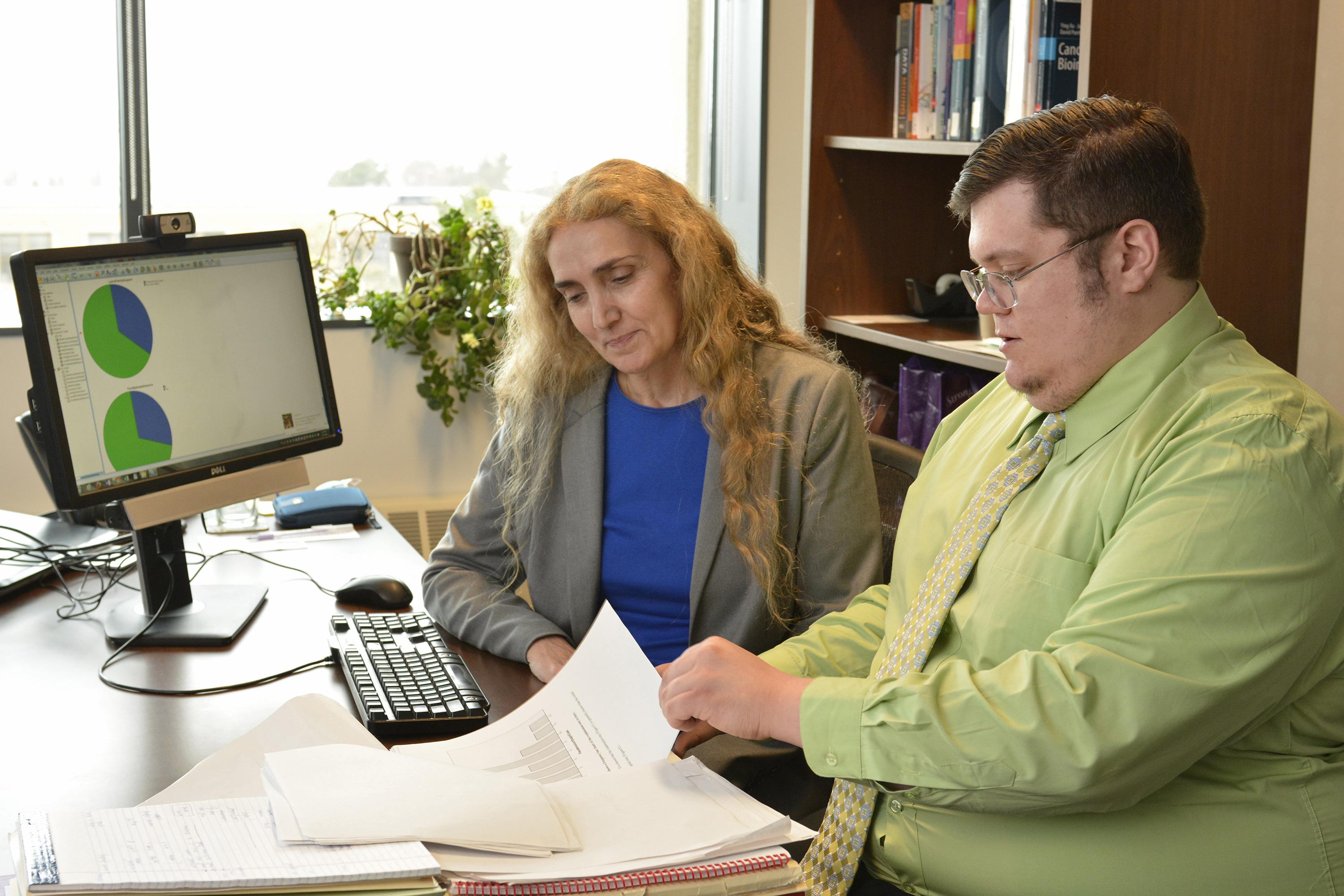Psychiatric study—Logan Wells, a student in SUNY Oswego’s graduate degree program in human-computer interaction and graduate certificate program in integrated health systems, goes over a draft for his capstone research project with adviser Dr. Isabelle Bichindaritz, director of biomedical informatics. At Oswego’s Quest symposium on April 13, Wells plans to make a presentation on the data analysis he has done in cooperation with SUNY Update Medical University on costly hospital psychiatric readmissions.
A SUNY Oswego graduate student will present at the college’s Quest symposium on April 13 his data analysis project to assist SUNY Upstate Medical University in determining how to support patients who often seek costly hospital psychiatric readmissions.
Logan Wells, a student in Oswego’s human-computer interaction degree program and its integrated health systems certificate program, is working with information drawn from patient interviews and charts provided by the state Office of Mental Health’s Readmissions Quality Collaborative.
At Quest, the college’s annual celebration of student, faculty and staff scholarship and creativity, Wells will brief an audience on his project titled “Analyzing Causes Behind Psychiatric Readmissions in Upstate New York,” a data-driven study mentored by Dr. Isabelle Bichindaritz, director of biomedical informatics at SUNY Oswego.
Bichindaritz, who is working with the SUNY Labs to Jobs Consortium to establish a biomedical and health informatics research laboratory, said she was looking last fall for research projects to assist Upstate Medical University, a consortium member along with SUNY Oswego, SUNY College of Environmental Science and Forestry, and Morrisville State College.
Dr. Stephen Glatt, associate professor of psychiatry and behavioral sciences at SUNY Upstate, proposed the psychiatric readmissions study last November, and Wells took the project on as his capstone for the integrated health systems certificate.
“I have a background in psychology as an undergraduate,” said Wells, who earned a bachelor of arts degree from Oswego in 2014. “I would like to find a correlation that would help these patients, because whatever is happening (in their personal lives after discharge) isn’t really working for them.” Hospitals and insurers also would like to find ways to cut costs associated with frequent readmissions.
Digging deeper
The majority of patients voluntarily seek an initial psychiatric hospitalization, and the preponderance is for symptoms related to depression—such as suicidal thoughts—and substance abuse, Wells said. Most of those seeking readmission also do so voluntarily, he said.
Many of the patients are back at Upstate’s emergency room, seeking readmission, in less than 30 days. Wells said his analysis to date shows that the predominant reasons are patients did not adhere to doctor’s orders, such as medication regimen, or believed they lacked family support.
Wells intends to dig deeper, conducting analysis of textual sources such as patient interviews in search of root causes.
“We are hoping to find some sort of pattern among patients why they are not following medical adherence after discharge,” he said. “We are also trying for a grant (to extend the work).”
Bichindaritz said she advised Wells to present his findings at Quest. “He’s done very good work on this project and put in a lot of effort,” she said.
“I think Quest is a good opportunity for students to see the work our graduate students are doing so they can think about applying for our graduate programs,” said Bichindaritz, who is leading SUNY Oswego’s effort to establish a new graduate degree program in biomedical and health informatics. “It is very important for students to practice presentation skills.”
For more information about SUNY Oswego graduate programs, visit oswego.edu/gradstudies. Details about Quest, including an upcoming comprehensive schedule, can be found at oswego.edu/quest.




